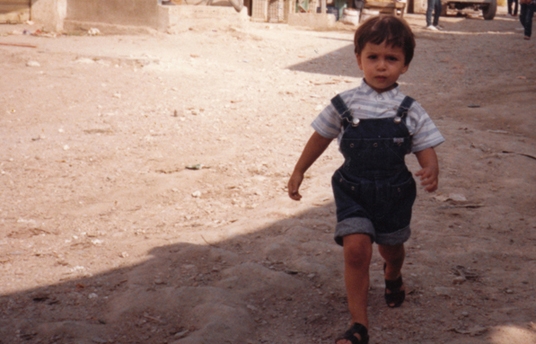Edinburgh International Film Festival Review: A World Not Ours
Jun 16, 2013

By Nicholas Davies
Mahdi Fleifel’s ‘A World Not Ours’ has been making the rounds on the festival circuit since its premiere at the Toronto International Film Festival last September and shows at the Edinburgh International Film Festival this week. Since then, it has been generating buzz as a wonderful, low-key film that takes us somewhere we’ve never been and shows us something we’ve never seen. After looking forward to seeing it for months, I’ve finally had the chance to take a look and I’m immensely glad to say that the hype is very much to be believed.
Using his video-camera-mad father’s home-movie footage as well as his own video diaries, Mahdi takes us inside Ain el-Hilweh, the Palestinian refugee camp in Lebanon adjacent to Saida, where he has lived intermittently over the years, though he is now a Danish citizen. The one-square-kilometre camp houses 70,000 people and has been inhabited by displaced Palestinians and their progeny for 60 years. It is, in a word, depressing.
But this impression is immediately undercut by Mahdi’s own take on the camp. As the camera wanders (it is perpetually on his shoulder) through the narrow, rubble-strewn streets full of aimless children playing war games, he narrates his memories of returning here for holidays in his childhood (his parents decamped to Dubai in the 70s) and of a brief time living there before the family emigrated to Denmark. It was a place of wonder and excitement, friendships and family. For a kid, it was cool. It was home. This feeling is starkly underlined later in the film – the Fleifel family emigrates to the lush greenery of Denmark, but Mahdi longs to return to Ain el-Hilweh.
The film introduces us to Mahdi’s grandfather, a crotchety octogenerian who lashes out crankily at the kids playing raucous games of football in the streets, and who refuses to leave Ain el-Hilweh, forever holding to the idea of the right to return. Mahdi’s uncle Said, once the hero of the camp’s youth, is another central subject; since the untimely death of his equally revered elder brother, Said seems to have gone a wee bit mad – unpredictable and cranky, he spends his time playing the town fool and tending to his pigeons.
At first, these endearing fellows are played for gentle comic effect – Fleifel’s version of ‘He’s a real character!’ – that amusing family album that we all bring out at dinner parties. But over the course of the film, our sympathies for both grow. Broken men with broken lives, their futures are pipe dreams that we – and, tragically, they – sense are never to be realised.
But the film’s central relationship is between Mahdi and his childhood friend Bassam – nicknamed Abu Eyad, after the chief of intelligence of the PLO. This is a wonderfully close friendship – the guys are like brothers, sharing an immense love of World Cup football and trading advice about how to manage girlfrends. But there is a fundamental opposition between them: Mahdi, with his European passport, is only ever a visitor to Ain el-Hilweh, always with the option of leaving (indeed, whenever he wants to go into the camp, he has to argue with the Lebanese army guards who control the entry points); Bassam remains a true refugee, devoid of rights and effectively barred from leaving his kilometre-square stomping ground.
It is this counterpoint that brings ‘A World Not Ours’ its most heartfelt but compelling empathy. Bassam is simply charming – quick to smile and never without an off-the-cuff joke – but at the same time, he is enveloped in a dark rage directed at the people and situations that have set him adrift in a pointless succession of empty days. In one of the film’s darkest moments, Bassam suggests that the suicide bombers who originate from the camp are not driven by religious fervour or even the desire for revenge. Rather, they attack Israel as the only way to make a final exit from Ain el-Hilweh.
This is personal documentary at its most powerful – obviously and unashamedly far from objective, Mahdi’s depiction of life in Ain el-Hilweh is nevertheless primarily observational. Mahdi guides us through the film with narration that is so intimate and plain-spoken he feels like an old friend – at times he seems as bewildered by his discoveries and reactions as we are. Perhaps its greatest impact stems from the fact that the film makes no grand gestures. It is not driven by vengeance or explicit political didacticism; it does not even read as a plea for assistance for the Palestinian cause.
Nevertheless, the film is underpinned, almost imperceptibly, by Mahdi’s seemingly casual mention of David Ben-Gurion’s 1949 statement about the nearly three-quarters of a million Palestians who were driven from their homes to make way for the state of Israel: ‘The old will die and the young will forget.’ ‘A World Not Ours’ gives the lie to that notion. The old will die, this is certain. But even if they disperse, even if they abandon their diminishing hope of the right to return, it is painfully clear that the young will not forget.
‘A World Not Ours’ – Trailer